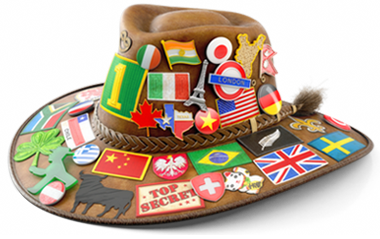
Road trips are often the best way to experience the elusive essence of a country’s identity, history and natural environment. Able to choose your own adventure, you have the freedom to visit whatever attraction you desire and every day is different. Cosmopolitan cities, natural phenomena and jaw-dropping scenery are all at your fingertips when you choose to embark on a road trip.
Renting cars is often cheap, with rental services operating in some capacity in nearly every country across the globe. Even Easter Island, stranded in the Pacific Ocean and famous for its isolation, has a car rental service. Travelling by car is convenient, can often be cheaper than public transport, and can take you places that would be impossible to reach by train, plane or ferry. However, not one day on the road is the same at home and nor would it be overseas. To avoid a driving disaster, we have come up with a few tips to keep you safe on your next road trip.

In many EU countries, such as France and Austria, you must keep a fluorescent jacket in the passenger part of the car. You must put this on if you break down, or if you stop to assist someone who has broken down. As for the rest of the EU?
* In
* If you need to wear glasses, you are required to carry an additional pair when driving in Spain.
* In Sweden it is illegal to drive without headlights, even in broad daylight (the sun never sets in some parts of Sweden during June).
* In France, it’s strictly BYOB: all cars need to have an unused breathalyser on board.
* In Belarus you will be slapped with a hefty fine if you’re caught driving a dirty car.
In the rest of the EU states, including Germany, you must carry a warning triangle and a first aid kit. But your warning triangle won’t get you far if you breakdown on Germany’s world-famous Autobahn. It is illegal to stop unnecessarily on the Autobahn, and breaking down is considered unnecessary. So, before you let your inner speed demon get the better of you, check that fuel gauge.

You need to hold the correct Australian licence for the vehicle you are driving, and it must be valid in the country you are in. When renting a car in Europe or North America your Australian licence is often sufficient. However, an International Driver’s Permit (IDP) is an inexpensive additional security. Plus, it is better to be safe than risk the wrath of a particularly pedantic car rental representative. Remember, what you need is an International Driver's Permit (IDP), not an ‘International Driver's Licence’. The International Drivers Permits are often referred to as a licence, but be wary that the International Driver’s Licence is a scam document sold online, often at inflated prices. An IDP will set you back around $39 if purchased from the NRMA.

Always inspect the vehicle before hire and document any damage with the sales assistant, no matter how minor the damage is. You should usually be given a vehicle diagram with all marks and scratches highlighted, amend this accordingly.
Take photos of the vehicle before you drive off with it and also at the end of hire, especially if there is damage to the vehicle before you leave. You can save considerable hassles at the end of the rental by just taking the time to note every scratch and dent.
In the event of an accident or theft of the vehicle always get copies of paperwork like police reports, invoices, vehicle repair documents, and anything else that you will need to support your insurance claim.
Ask about weekend specials, late penalties and fuel charges. Many unadvertised discounts and hidden costs will not be explained at the time of rental, and it may be too late by the time you've discovered them.
If you book a small economy car, it is quite common to get upgraded at the airport if those cars have sold out, in which case you will usually get the upgrade at no additional cost. You can usually still change your booking at the airport if you don't get upgraded.

Accidents happen. If your rental car is damaged or stolen, or if your car damages another vehicle, injures or even kills someone, your liabilities to the rental agency (and possibly others) can go far beyond the fee you agreed to pay for the rental. Make sure you choose the right travel insurer so you’re properly covered. With 1Cover you will be covered whether it was your fault or someone else’s. The policies will cover you up to $5000 for the rental car excess that could be incurred in the event of an accident, whether you are at fault or not.
 Long-term travel isn’t a holiday, there are a few things you need to think about.
Long-term travel isn’t a holiday, there are a few things you need to think about.
 There are certain tough lessons that going out on the road will force you to learn.
There are certain tough lessons that going out on the road will force you to learn.
 We’ve developed something of a reputation abroad. Sometimes good, sometimes bad.
We’ve developed something of a reputation abroad. Sometimes good, sometimes bad.
 You’ll definitely buy one of these.
You’ll definitely buy one of these.
Have a fun, safe & enjoyable holiday with our guide to staying safe in Bali.
1Cover’s UK Survival Guide is packed full handy hints, tips and tricks from those in the know.